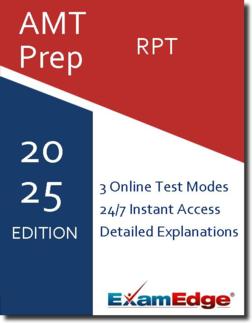AMT RPT (RPT) Practice Tests & Test Prep by Exam Edge - Test Reviews
Based on 32 Reviews
- Real Exam Simulation: Timed questions and matching content build comfort for your AMT RPT test day.
- Instant, 24/7 Access: Web-based AMT Registered Phlebotomy Technician practice exams with no software needed.
- Clear Explanations: Step-by-step answers and explanations for your AMT exam to strengthen understanding.
- Boosted Confidence: Reduces anxiety and improves test-taking skills to ace your AMT Registered Phlebotomy Technician (RPT).

AMT RPT (RPT) Practice Tests & Test Prep by Exam Edge - Review
AMT Registered Phlebotomy Technician - Reviews
Excellent
Based on
160
reviews
“ I took the AMT CMAS test this past Monday and got a perfect score. Exam Edge was a huge help!
Sue B, Colorado Springs, CO
See why our users from 154 countries love us for their exam prep! Including 32 reviews for the AMT RPT exam.
Exam Edge is an Industry Leader in Online Test Prep. We work with our Institutional Partners to offer a wide array of practice tests that will help you prepare for your big exam. No Matter how niche field of interest might be, were here to help you prepare for your test day.
| 2.8M | 4.5M | |
| Users | Tests Taken | |
| 100K | 19 | |
| Unique Exams | Years in Business | |


